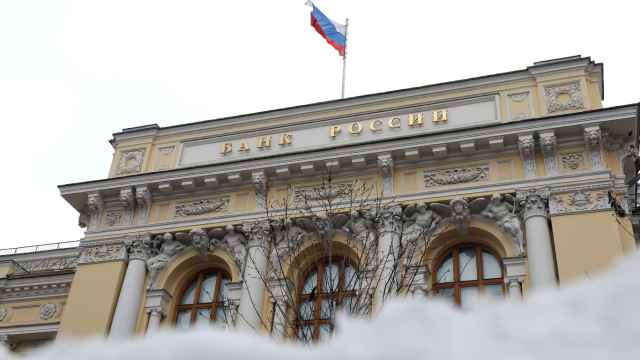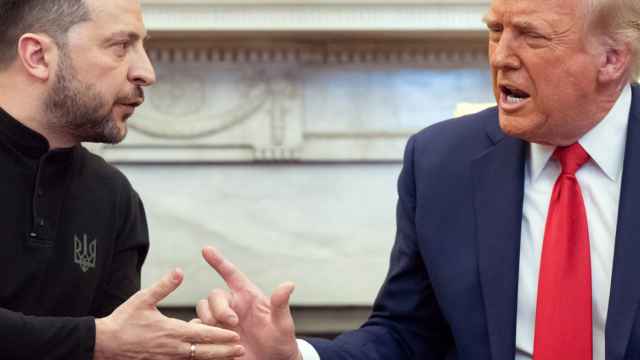Russia's debate over joining the World Trade Organization has often been a fractious one. As the Federation Council approved Russian membership on Wednesday, many of the more bitter arguments have been rehearsed again. Economic Development Minister Andrei Belousov has rightly stressed that there will be costs as well as benefits. Russia will lose exports to competitors and revenues from trade taxes. But what it stands to gain in the benefits of competition, lower-priced imports and new inward investment is even greater — provided Russia actively pursues these potential benefits.
Russia's attitude toward the WTO has often appeared to shift from year to year. When I was European Union trade commissioner and initiated a push for Russian membership in 2007, the idea had influential supporters in Moscow. They were convinced that it would help reinforce the reform agenda and create new trade and investment opportunities. That group of reformers has not always seemed to have the influence to swing the debate.
There was always something incongruous about Russia's absence from the WTO. Russia is not only the largest economy outside of the WTO, it is the only economy of any significance at all outside the WTO. In the era of the Group of 20, Russia's absence from the WTO weakens the credibility of both. But it is obviously not enough to want to see Russia in the WTO simply because it is a large and influential country and the WTO is an important club.
It is now crucial for Russia to stamp out the suspicion that it has sought WTO membership purely as a confirmation of its status as an international superpower among the largest global players. Russia must develop an active, strategic approach to its membership. Membership in the WTO must not just be an end in itself but an important means for Russia to grow its economy. In the past, President Vladimir Putin described WTO membership as a tool. He was right. Russia should not just join the WTO. It should use it.
WTO membership can help challenge some basic international perceptions of Russia as a place to do business. As Putin noted recently, international perceptions of Russia remain heavily conditioned by the perception of "Russia risk." Investors fear a lack of transparency, and traders fear customs rules that can change with no apparent accountability.
The most important way Russia can use WTO membership is by sending a strong signal to international investors and its own business community where Russia intends to go from here. Capital is leaving the country at damaging levels, and while some of the flows result from a general search for safer investments at a time of great volatility, they are also a sign that investors are unsure about the country's economic direction. Russia needs fresh capital to finance its growth, and the wariness of foreign inward investment is the single biggest impediment to diversifying and expanding the economy.
While the country is blessed with great natural resources, this is also in some sense a curse. It encourages complacency. With the government renewing its efforts to upgrade Russia's industrial base, WTO membership will provide binding rules that will offer confidence to foreign investors and opportunities for local exporters.
The contract that WTO membership implies will encourage the kind of good behavior the Russian economy needs to diversify. Local critics may mourn the removal of the freedom to subsidize and to levy duties to protect domestic industries from competition. But it is also a guarantee that Russia's trading partners will be held to the same disciplines. Non-discrimination will apply equally to all. I predict that industries like steel, chemicals, automotive, IT and, of course, retailers are going to see new investor and trader confidence as a result of these changes.
Entered into with genuine intent, WTO membership sends a message about diversifying the Russian economy and the anchoring of reform that investors and markets will pay attention to. Joining the WTO means signing on to the rule of rules. Some in Russia have always seen this as an act of weakness. In reality, however, it is an act of self-confidence in the country's long-term economic success as an open market economy. Investors will be looking for Russia's actions to reinforce the message.
Should Russia choose, WTO membership will also be a useful platform for establishing closer economic ties with the European Union. The fact that Russia was outside the WTO has always been a source of tension for EU states. It was also an excuse for both sides to shelve the idea of a common economic space between the EU and Russia that has languished since both sides signed up to a joint vision statement in 2007.
This vision, which was based on the simple idea that freer trade and investment and easier travel for people would be good for both the EU and Russia, needs revival. Given the long and difficult history of this relationship, this will not be easy. But WTO membership at least provides a basic economic framework for closer, privileged integration that gives the process a place to restart.
What worries some foreigners is that Russia's heart is not in WTO membership. It is joining the club, but is less interested in enforcing the rules. The single most important way in which Russia can use WTO membership is to prove them wrong by making it the first step in a longer process of economic leadership, engagement and reform. The real benefits to Russia will come not from the symbolism of joining the WTO but from the substance of what it does as a full-fledged member of the organization.
Peter Mandelson, who was European trade commissioner from 2004 -08, is chairman of .
A Message from The Moscow Times:
Dear readers,
We are facing unprecedented challenges. Russia's Prosecutor General's Office has designated The Moscow Times as an "undesirable" organization, criminalizing our work and putting our staff at risk of prosecution. This follows our earlier unjust labeling as a "foreign agent."
These actions are direct attempts to silence independent journalism in Russia. The authorities claim our work "discredits the decisions of the Russian leadership." We see things differently: we strive to provide accurate, unbiased reporting on Russia.
We, the journalists of The Moscow Times, refuse to be silenced. But to continue our work, we need your help.
Your support, no matter how small, makes a world of difference. If you can, please support us monthly starting from just $2. It's quick to set up, and every contribution makes a significant impact.
By supporting The Moscow Times, you're defending open, independent journalism in the face of repression. Thank you for standing with us.
Remind me later.





